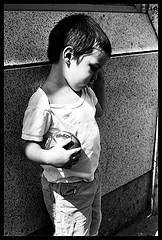Because It Is Hard
By: Gari Lister
“We choose to go to the moon . . . not because it is easy, but because it is hard . . . because that challenge is one that we are willing to accept, one we are unwilling to postpone, and one which we intend to win.. . . ” John F. Kennedy, Jr. (Sept. 12, 1962 at Rice University)
Orphan Sunday vs. Orphan Reality
By: Julie Beem
Religion that God our Father accepts as pure and faultless is this: to look after orphans and widows in their distress and to keep oneself from being polluted by the world. – James 1:27
“Loss” – The “L” Word

By: Jane Samuel
Driving to school this morning my youngest (chronological age 11, emotional age – always open for debate) and I were discussing her father’s upcoming business trip to Asia. Pulling up to a stoplight, I glanced sideways and did a quick check of her demeanor. While she has gotten much better in the past few years about family members coming and going in her life, I still try to be on the lookout for signs that an upcoming loss – albeit a temporary one – might flip her internal emotional balance on its end. “Trigger her” as we say in the therapeutic parenting business.
I’m So Strong . . .
by: Julie Beem
“I’m so strong that I could destroy this whole house.” His declaration was matter-of-fact, not launched as a threat but to gauge my response. “Really?” I responded, “why would you want to destroy my house?” “Because I’m powerful enough.”
Letting Go
by: Jane Samuel
She calls me from the spa-sleep-over-birthday-party and I am not surprised. There is a catch in her voice and she is asking me to bring money. I don’t question. I just get in the car and drive to her.
Abandoned
By: Jane Samuel
I knew the minute my husband pulled out of the lot and darted across the street to drop me at the pharmacy that it was a bad idea. Our youngest had run back into the retirement home where my father lived to retrieve a forgotten item and my husband thought it would be quicker to pull across, drop me, and run back and get her while I shopped. Problem is he didn’t tell her. He just figured he could get back before she noticed. Wrong.
Resilience – Inborn or Learned – Part 2
By: Julie Beem
The listing of factors that make children resilient from Resilience Theory: A Literature Review by Adrian DePlessis VanBreda made total sense to me. But the paragraph of conclusion supposedly based on these factors did not:
Resilience – Inborn or Learned – Part 1
By: Julie Beem
There’s a lot of talk about resilience being the antidote to trauma. Lots of workshops, books, and training programs talk about building resilience in kids as a way to counteract the impact of trauma in their lives. On the surface all this seems to make sense, but it’s always puzzled me. What did people mean by resilience, and why does it appear that my child has none, even after years of parenting her?
Dos & Don’ts: An Adoptive & Foster Parent’s Letter to Family and Friends
ATN is delighted to include another post from Carol Lozier. Carol, a member of ATN’s Board of Directors, is a clinical social worker in private practice in Louisville, Kentucky. Her website, www.forever-families.com, offers a blog, free downloadable tools for families, an excerpt of her book, and a supportive community of adoptive and foster parents.
By: Carol Lozier
Have you ever noticed that adopted and foster kids are especially cute? Their beautiful eyes, cute noses, and charming smiles often call attention to them and to their family. In the midst of this attention, adoptive and foster parents often hear remarks of how their parenting could be more effective, or possibly that they are expecting too much or too little from their child. Understandably, parents are caught off guard as they are hit with a critical comment, and sometimes are not sure how to address them.
I wrote the following letter, found on page 63 of The Adoptive & Foster Parent Guide, to help families express their needs and requests to their family, friends, church, after school caregivers, teachers, physicians, and others. Parents, please copy and use this letter; share it with your adoptive and fostering friends. Send the letter to any person(s) in your life who may gain a new understanding of how to help you and your family.
What’s in a Name? Part 4 – Is Keeping a Wrong Label OK?
By: Julie Beem
Many of the parents who contact ATN have children with multiple diagnoses and we’re frequently puzzled about which ones are the “right” ones. I’m included in that group. My child has an alphabet soup of diagnoses, including autism spectrum and ADHD/OCD/Tourettes (aggravated by her trauma.) Fortunately for us, we had professionals who also recognized the RAD, PTSD, DTD components and pointed us in the right directions for treatment of those. Yet, her developmental and processing struggles continue.